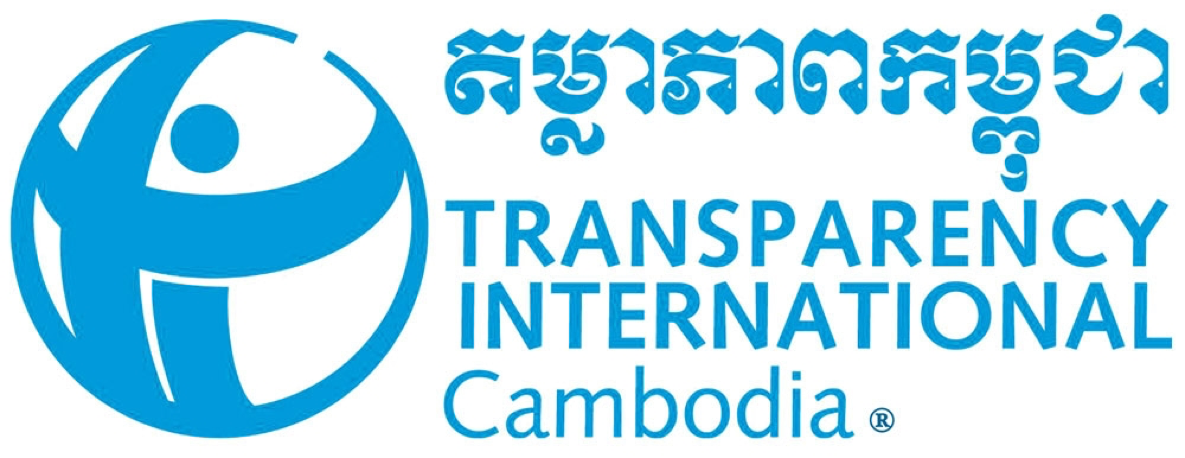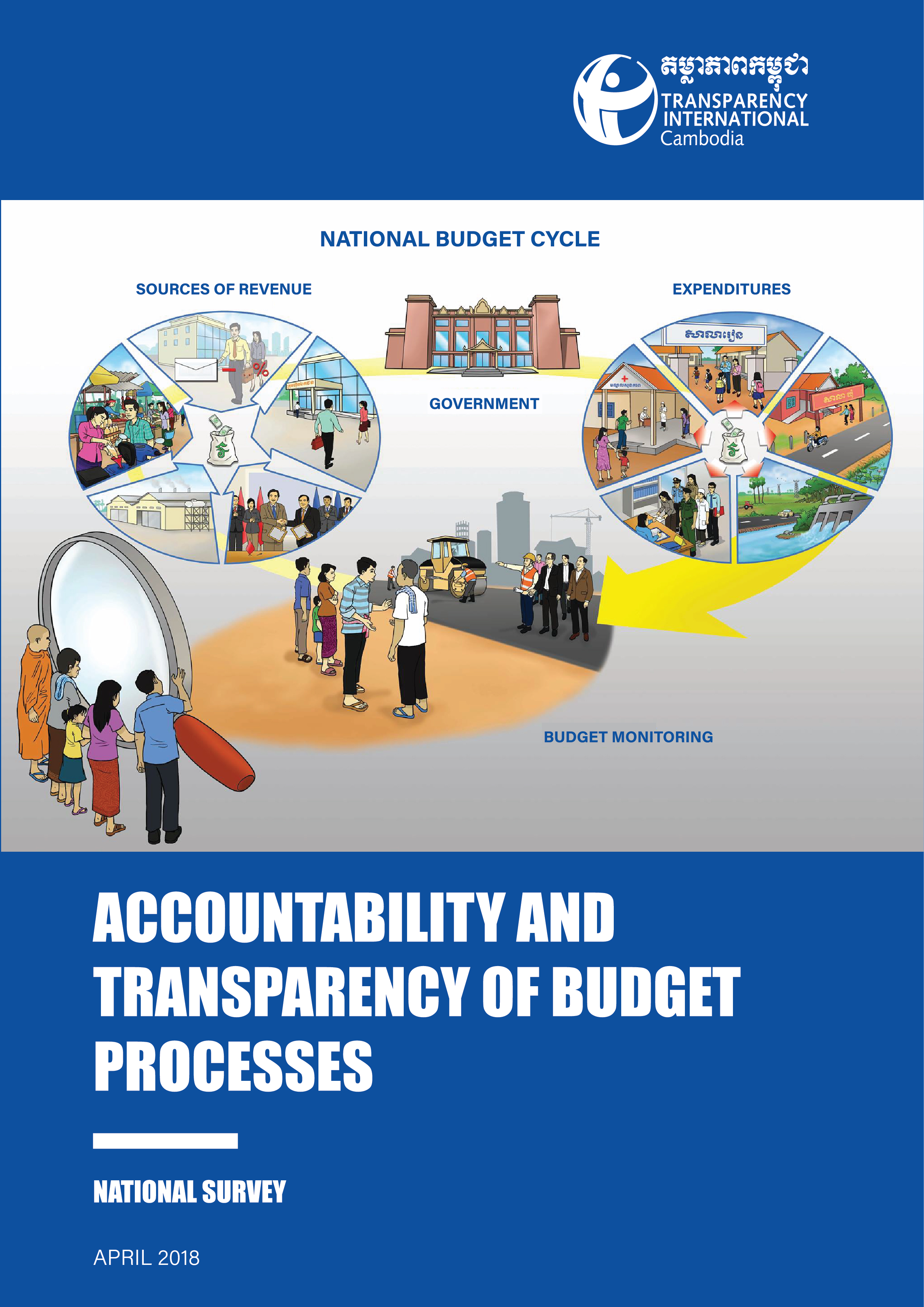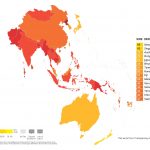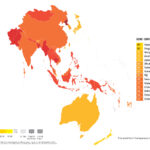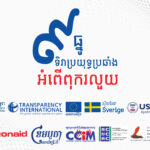Public’s Perception Survey Report on Accountability and Transparency of Budget Processes
Press Release
Phnom Penh, 09 May 2018 – Transparency International Cambodia (TI Cambodia) launches a Public’s Perception Survey Report on Accountability and Transparency of Budget Processes. This report presents the findings of a nationally representative survey, seeking to understand and quantify citizens’ perceptions and attitudes toward budget transparency and accountability in Cambodia, as well as their awareness and experience in dealing with budget and budgetary issues in the country. This survey took place in October 2017, employing random sample selection methods and collecting responses from 1,596 individuals in 200 villages in 100 communes across all 25 provinces of Cambodia.
The findings of the survey are summarised into two parts, presenting survey data from national and Commune/Sangkat components of the survey, respectively. The survey’s key findings suggest that citizens’ awareness, access to information and participation in both national and Commune/Sangkat budget processes are generally low. The analysis also notes that these findings are strongly affected by socio-demographic and socio-economic variables, including gender, education and geographical distinctions.
Public understanding of budget processes is a cause for concern. Only 0.3% of the sampled population are able to correctly identify the total amount of Cambodia’s national budget for 2017. Regarding public awareness on national income and expenditure, about 33.4% of the people were unable to identify any source of government revenue, while 46.4% were unable to identify any national expenditures. However, public knowledge and understanding of commune budget processes are generally higher than that at the national level. 37.5% of the sampled population can identify who is mainly responsible for Commune/Sangkat budget preparation.
Meanwhile, public access to relevant information in relation to national budget is another cause for concern. Of those surveyed, only 0.1% had ever seen a government budgetary document, and only 1.1% of people had ever attempted to view budgetary documents. Similarly, citizens’ access to budgetary information at the Commune/Sangkat level is also limited, with many unaware if budgetary records are maintained by their Commune/Sangkat Council. As many as 90.2% of citizens reports that they have never received any information from their Commune/Sangkat authority about the dissemination of budgetary records, while 96.5% of citizens have never tried to view Commune/Sangkat budgetary records. However, there is strong support for improved access to timely and transparent information at the Commune/Sangkat level. 98.5% of citizens believe that Commune/Sangkat budgetary information should be made more accessible and easy to understand for the general public.
Reflecting the lack of understanding and access to budget information, levels of public participation in Commune/Sangkat budget processes are also low. Only 28.6% of citizens had previously exercised the right to participate in the annual meeting for the Commune/Sangkat development plan, investment programme and budget. 91% of citizens believe that the quality of services or projects would be improved if citizens could participate more in budgeting processes. Those who do not participate argue that a lack of encouragement to participate and a lack of dissemination of information about participation opportunities prevent them from doing so.
TI Cambodia calls upon the government to make greater efforts to inform the public about both national and Commune/Sangkat budget processes. Improving public knowledge in this way will not only generate a greater sense of ownership concerning budgeting in general, but is also required as a means to achieve the remainder of the recommendations outlined in this report. The national government should increase budget accessibility for the ordinary citizen to satisfy high levels of public interest in public budgeting and finances. Merely publishing information is not enough, however. The national government should also consider how this information is presented and how it is distributed and spread, to ensure a wide reach and accessibility of the information. Additionally, the government should also improve its outreach programmes and encourage citizens to participate in budget processes.
Mr Preap Kol, Executive Director of TI Cambodia, said that “The survey will provide evidence to relevant governmental and non-governmental organisations, as well as development partners, looking to deepen their understanding about citizens’ perceptions of and attitudes toward budget and public finance management matters in Cambodia, both at the national and sub-national levels. This knowledge, in turn, can help them in the formulation or reform of policies and programmes to increase budget transparency and accountability.”
Media Contact:
Mr Preap Kol, Executive Director of TI Cambodia
Phone: 012 877 833
Email: kolpreap@ticambodia.org
###
Transparency International Cambodia (TI Cambodia) is a National Chapter of Transparency International, a neutral and independent civil society organisation leading the fight against corruption. The organisation has a mission to work with all key stakeholders including the Government, Civil Society Organisations, Private Companies, other relevant stakeholders and citizens to promote transparency, integrity and accountability and reduce corruption in Cambodia.
សម្រាប់សេចក្ដីថ្លែងការណ៍ព័ត៌មានជាភាសាខ្មែរ សូមចុច Press Release in Khmer
For full survey report on Accountability and Transparency of Budget Processes (English), please Click here
For summary survey report on Accountability and Transparency of Budget Processes (English), please Click here
សម្រាប់របាយការណ៍សង្ខេបស្ដីពី គណនេយ្យភាព និងតម្លាភាពនៃដំណើរការថវិកា (ភាសាខ្មែរ) សូមចុច ទីនេះ
For slide presentation of Research Methodology of National Survey on Accountability and Transparency of Budget Processes, please Click here
For slide presentation of Survey Findings on Accountability and Transparency of Budget Processes, please Click here
 English
English